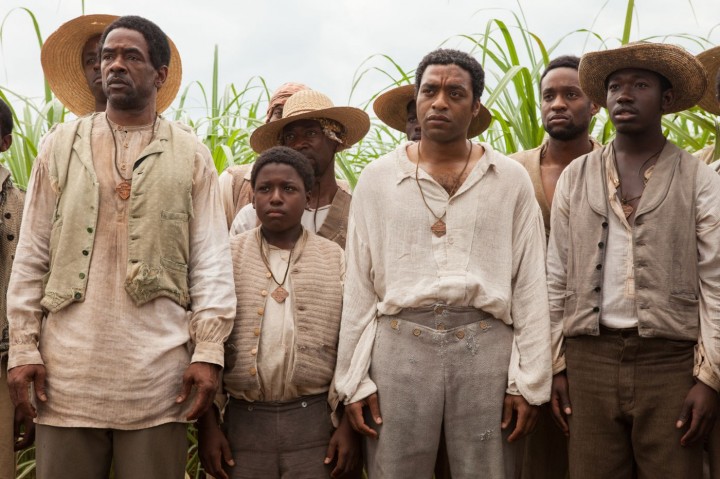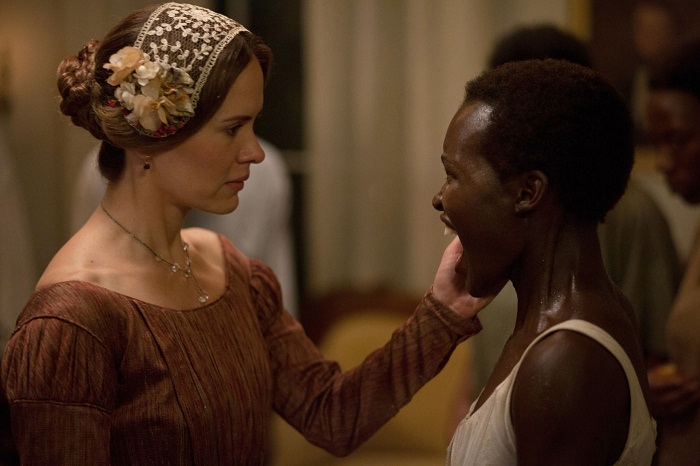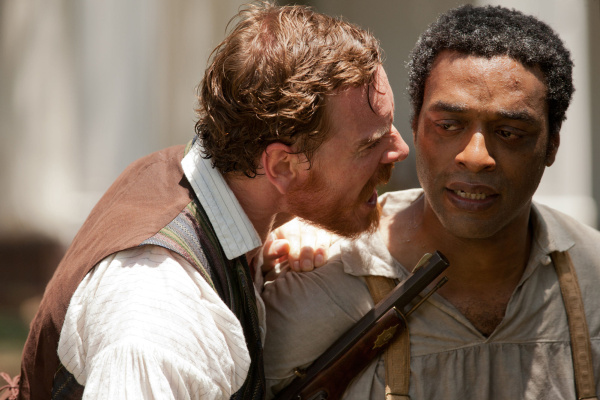“You’ll forget about your family soon enough” says a Plantation Owner’s wife. The line is spoken compassionately to a crying female slave named Eliza, who had just had her two children stripped away from her during a slave auction. While Steve McQueen’s 12 Years a Slave does a vivid and horrifying job painting the physical tortures of slavery, it also, and I’d argue even more frighteningly so, portrays the blind acceptance of an institution that degraded an entire race of people.
12 Years a Slave makes the uncomfortably honest point that human beings will go along with anything, as long as it’s the status quo. This is because it’s easier than the realization of what slavery really was — a shocking and shameful breach of our country’s firmly held belief that all men are created equal. It’s in the Declaration of Independence for god’s sake, and yet the mass majority chose to ignore it and put the faces of animals on our black brethren because we wanted cheap labor.

12 Years a Slave is about the lies we told ourselves as a nation about what was morally right and the refusal to accept the fact we sacrificed parts of our soul for profit. More a psychology lesson than a history lesson, 12 Years a Slave is hands down the best film of the decade that easily towers over any movie or television program ever produced about the topic.
Beyond all these larger themes, 12 Years a Slave is a story of a man in a fish out of water scenario. Solomon Northup (Chiwetel Ejiofor) is a rarity amongst rarities, a freed black man in America circa 1840 living with his wife and children. A great violinist, Solomon is tricked by two smooth-talking show runners (Killing Them Softly‘s Scoot McNairy and SNL’s Taran Killam) and sold into slavery. Going from plantation to plantation, he experiences different types of slave owners from the compassionate but ultimately spineless William Ford (Benedict Cumberbatch) to the absolutely insane and cruel Edwin Epps (an unbelievably intense Michael Fassbender) over the course of twelve years.
The film is based on Northup’s autobiography of his experiences as a slave, and from what I’ve heard, the film is a strikingly faithful adaptation of the source material. The screenplay does an amazing job of integrating smart social commentary into the dialogue without sounding preachy or without making the actors seem like merely mouth pieces for the screenwriter’s beliefs.
McQueen’s resident cinematographer Sean Bobbitt, beautifully captures the Southern landscape that powerfully contrasts with some of the more horrific images of the film. Hans Zimmer (The Dark Knight, The Dark Knight Rises) provides a heart-wrenching score that enhances every scene.
However, none of this would be possible without director Steve McQueen, who could have let this become just another mind-numbing but pretty-to-look-at historical epic. Instead, he opted for an artfully shot one that was large-scale but still felt small and intimate.
Unlike most historical dramas about important issues, some of the best scenes are two person encounters moved along entirely by dialogue. Some of the most emotionally draining shots of the film are extreme close-ups on individual characters.

I’ve always loved McQueen as a director because he’s less interested in glamorous set pieces and sweeping landscapes, and much more focused on the story and the actors. Here, he gets amazing results from them without it ever seeming cheap or overly-sentimental.
Everything is earned. This isn’t Spielberg’s The Color Purple. This is a brutal, unflinching look at slavery that refuses to give you any form of comedic relief or escape from the atrocities being played out in front of you. It is impossible to walk away from this film unscathed.
In the absolute performance of a life time, Chiwetel Ejiofor plays Solomon Northup with such raw emotion and horror it’s impossible not to be moved to tears. As the surrogate for the audience member, he makes you feel and reflect on every horrible thing that happens to him.
Lupita Nyong’o gives an equally amazing performance as Patsey, the object of Edwin Epps’ (Fassbender) obsession who is abused both emotionally and physically for that reason. Truly one of the best working actors today, Michael Fassbender gives the most impressive performance of the film. He could have easily made Epps a one-dimensional monster, but Fassbender is smarter than that. He creates an unsympathetic yet emotionally tortured man who uses abuse as a way of dealing with his feelings of inadequacy.

From Fassbender’s wife (a brilliant Sarah Paulson) belittling him in front of his slaves to the fact that he’s actually in love with one, Epps is always trying to prove to his “property” that he’s a real man. The real fucked up thing is that it almost seems like he wants these slaves to like him or be his friends, but the only way he knows how to make himself cool enough for that is by beating the shit out of them. What makes Fassbender’s performance so chilling is that he’s able to convey all these elaborate possibilities through subtext.
The film has caught some flack on the account of the celebrity cameos being too distracting, but that couldn’t be farther from the truth. While these actors are high-profile, they are also deeply gifted performers who enrich and bring to life one-dimensional bit parts.
Alfre Woodard is great as the slave turned slave master’s wife delivering a monologue about using your sexuality as a means of defense. Brad Pitt is perfectly cast as the sympathetic abolitionist because he really is the golden white boy of our generation. Paul Dano is terrifying in a familiar role as a cruel little weasel, and Benedict Cumberbatch is always adept at creating tortured souls. The real stand-out of the cameo line-up is Paul Giamatti as a cold-hearted slave auctioneer. He plays the part so real you forget it’s him.
“12 Years a Slave” is an incredibly rewarding and unforgettable experience, one everybody should take part in. Simply put, it’s one of the best films ever made. Grade: A